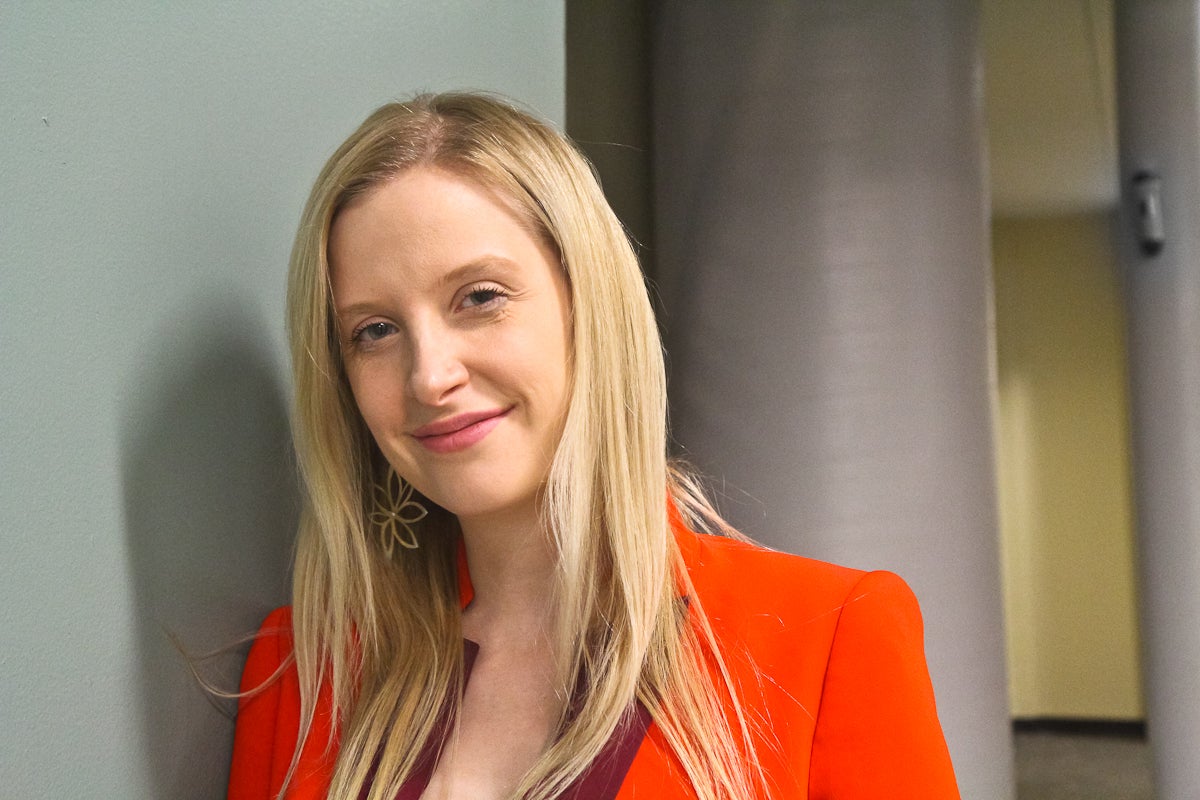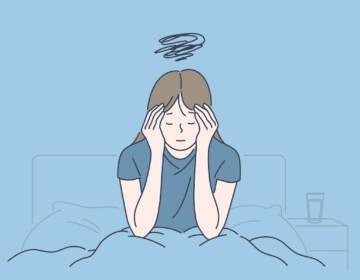When the words won’t come — recovering from a series of strokes in my 30s
Listen
(Kimberly Paynter/for The Pulse)
I wanted to read the lines so desperately, to force the words from the pages into my mind and out of my mouth. But they were ceasing to be words, sentences and paragraphs.
My eyes wandered up and down the winding maze of words, sentences and increasingly uncooperative paragraphs. I wanted to read the lines so desperately, to force the words from the pages into my mind and out of my mouth. But they were ceasing to be words, sentences and paragraphs. Just a moment prior, it had been so simple, so unremarkable. What I would not have given to rejoice once again in the act of communication.
From my chair, I heard distant muffled sounds and the bristling of onlookers trying to interact with me. Before me, college sophomores, juniors and seniors — bright-eyed and ready to learn Spanish — lined up in crooked rows of shabby, plastic chairs facing me from left to right.
I continued, not yet completely discouraged, wondering if I was just nervous — Yes, it must just be a simple case of nerves! — as these symptoms came at the same time that my father lay terminally ill in the hospital.
A quivering took over my body. My eyesight was clouded. I couldn’t see my hands. Thoughts danced through my mind candescent, burning, awaiting articulation And yet: Silence. I felt otherworldly. The words wouldn’t come.
I looked at my book and decided to fake it. I saw only vague, black smudges on the pages — blurry specks, like petty flies’ legs, mocking me. Thinking in English, y también en español, but not speaking y tampoco hablando in Spanish, my heart palpitating in my chest, I tried to write so that I might seem calm. I couldn’t.
I had lost all ability to communicate. Incomprehensibly and unbeknownst to me, I had become a speech aphasic — unable to produce or understand language, even though I was having thoughts. I could not speak. Or read. Or write. Or fully understand others. I could not count money. Or comprehend what numbers meant.
‘A looming sense of doom’
Yet lacking in full self-awareness, and still assuming that I was merely anxious, I left my students and headed home to Philadelphia. My body found its way to the parking lot. I made it to the unforgiving traffic of the Schuylkill Expressway, a congested, narrow, shoulderless, and walled-in road. Accelerate, stop; horn, cut-off; bottleneck, jam, stop. Repeat. The commuters and the buses and the taxis and the cop cars. A restless urgency, a looming sense of doom, came over me that made me want to fly over the cars in front of me — release the juggernaut from inside of me — and escape the hyperreal fits of that highway.
What power of deliverance guided me home that day? The miracle continues to elude me. A 360-degree fog of events with sporadic moments of clarity enveloped my horizon: My fingers curled around the door handle. I got out of the car into the dark underground garage. Murky lights, then, in the shadowy space, I slipped around poles and parked cars.
As I walked away from the car, I had the sensation that I was dropping things — not because I could feel anything fall — but because the buzz of the basement garage was punctuated by a faint clack, slap, scratch.
Just clumsiness, I thought. That, plus the dimness of the garage, made it hard to see the ground. But what I could not detect then was my sudden loss of peripheral vision. I sank to the ground to retrieve my sunglasses some six times. I trailed back in search of my keys, crouching directly above them and feeling around on the concrete.
Retreating from this bewildering day to my apartment, I was stopped at the door, which I could no longer remember how to open. I waited in dismay, fully aware of the mundanity of the task at hand and thinking silently of potential solutions. I am not sure how many minutes it took me to think of one. A key floated into my mind, but it was a ship without an anchor. The fear of the unknown stirred in me as I searched for the relationship between the key and the door. At last, I summoned the connection — key, lock — from my misty memory. I shut the door and walked to my bed to take a nap.
I had no food in the apartment, so I went to the grocery store when I awoke. I recall little of my time there, mainly the din of the pulsating, oppressive lights. While parking at home, I sideswiped my car on one of the yellow poles in the garage. It was not unusual to see other building residents’ cars decked out with yellow stripes, too. I chalked the experience up to an unwieldy garage layout and moved on.
Unpacking the groceries produced complicated physical sensations. The celery was a tipping point. The cold, weighty, leafy vegetable felt clammy, but I could not sense it completely with my right hand. It felt like my hand belonged to someone else. I began to wonder if the sensations were a side effect of my migraine medicine.
After putting away the groceries, I tried to use the computer. I pored over the screen and then over the keyboard, trying to produce some letters, but they had slipped away. In their place I saw scratches, dashes, utter nonsense. I adjusted the height of the chair — twice, three times. It did not help me see better. I moved closer to the screen. Closer. Closer. Closer. Now? No.
I went to bed for the night. I wondered if I had not given reading enough of a chance earlier, so I opened up the copy of Carlos Eire’s novel, Waiting for Snow in Havana: Confessions of a Cuban Boy, that I had been reading. The cloudy, kinked lines staring back at me told me nothing. I was aware that the parts written in Spanish appeared in italics and were often blocked off from the rest of the text. These words did not make sense, either. Words. Luminous, radiant words. They dwindled, dwindled, disappeared. I slipped into the stillness of sleep.
A diagnosis, and the ongoing road to recovery
The following day, I made my way to the hospital. After 14 hours of emergency room waiting, I was admitted as an inpatient to a neurointensive care unit (NeuroICU). There I learned that I had suffered a massive stroke resulting from a rare and unpredictable medical condition. (In all I would experience three strokes.) Though I was young and extremely fit, one of the carotid arteries supplying blood to my brain had spontaneously dissected.
Irony struck and my primary professional skill — communication — was compromised. Now to compensate for my continued struggles with language, fatigue and headaches, I make hundreds of adjustments. For instance: I sit close to speakers to read their lips and hear more clearly; I invented new techniques for following lines of text; I deal very slowly and deliberately with lists of numbers, letters and words to confront the everyday challenge of transposing them.
As I approach the completion of my doctoral program, such bodily experiences have shaped the way I research and teach. Illness and disability sit very far to the margins in academia and society at large. For example, as part of my dissertation project, “In the Shadow of ‘King Coal,'” a five-year ethnographic account of the impacts of deindustrialization in my native Anthracite Coal Region in northeastern Pennsylvania, I investigate how disabled individuals were treated by the coal-mining industry. This project is very important to me personally because my grandparents and great-grandparents labored in the local mines.
Students typically have little exposure to texts that generate meaningful discussion about disability. In exposing them to new material, I make it my project to bring personal experiences to teaching and to resist a body/mind split. This vulnerability allows me to talk freely and productively about the body and cultural and social obstacles we place in the way of bodies.
Elana Gordon produced the audio for this story.
WHYY is your source for fact-based, in-depth journalism and information. As a nonprofit organization, we rely on financial support from readers like you. Please give today.





